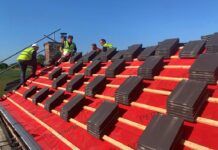In his latest budget the chancellor has announced he will invest £44bn in housing and set the ambitious target of building 300,000 new homes a year by mid 2020. The detail of how we will achieve this target was not clear and there will be those in the industry who will question whether we have the skilled workers and even the materials currently available to meet the target. The budget itself has provoked various responses and below is a selection from the Solar Trade Association (STA), the Federation of Master Builders (FMB), concrete roof tile manufacturer Forticrete and ilke homes – an offsite modular homes manufacturer.
John Lambert, managing director at Forticrete feels material specification is key to meeting the chancellor’s target. He said: “Not only do housebuilders need to start building sooner, they should embrace methods which make the process quicker and more cost effective. Material specification is key in achieving this. For example, in areas where planning constraints can slow the path of progress (and add cost to projects) there is a raft of products available. In particular, roofing materials that offer sustainable, cost-effective alternatives to natural stone and slate can be deployed and guaranteed to stand the test of time. Such specification choices offer a win-win for everyone in the supply chain.
“There is a risk, however, that housebuilders could face lengthy waits due to shortages of popular building materials. Anticipating the growth in demand, suppliers, like ourselves, have invested consistently over the last decade and in more recent times (2016), Forticrete has invested £8.5m bringing additional roof tile capacity to the market. Not only does this ensure housebuilders attempting to address the housing shortage have the products they need, but so too do the architects looking to ensure their projects enhance the visual appeal of the built environment. The pressure is on and whether the Chancellor’s proposals to tackle the housing crisis come to fruition remains to be seen.”
Leonie Greene, head of external affairs at the STA felt that solar was under represented compared to fossil fuels. She said: “It isn’t right that solar is being put at a disadvantage in the UK where it does not benefit from any of the tax breaks available to fossil fuels. The chancellor recognises our economy has no future without a planet, but is bending over a North Sea barrel to offer fossil fuels even more tax breaks.
“Importantly, the budget states that apart from honouring existing commitments, there will be no new public support for renewables that lead to an increase in consumer bills, until 2025. There is also no increase in carbon pricing, meaning no clear long-term signal for investors.
“Let’s be clear; the solar industry is not asking for any new public support – but we urgently need just some of the tax breaks available to fossil fuels today. And the whole energy industry needs a clear signal to continue to invest in low carbon power. We also believe solar can win effectively subsidy-free clean power (CfD) contracts today, so we now hope to see clean power auctions for established technologies resume on that basis.
“The chancellor still has an opportunity to take a small step in the right direction by including solar under the eligible technologies list for Enhanced Capital Allowances in the Finance Bill, when it goes to the Commons.”
Björn Conway, CEO of ilke Homes feels we need to look at our processes if we are to meet the ambitious targets. He said: “ilke homes welcomes Philip Hammond’s commitment to invest £44bn in housing and to build 300,000 new homes a year by the mid-2020s. It is hugely important that councils and housing associations across the UK adopt innovative construction techniques in order to ensure these targets are met. While there is no ‘silver bullet’, the use of precision manufacturing processes will go a long way towards delivering affordable new homes quickly and at a low cost.
“Modular homes can be manufactured off-site and installed in a matter of hours. As such, modular construction techniques will maximise the number of homes that councils can deliver within restrained budgets. Modular homes specialists can install ten homes on site a day, using precision manufacturing processes to create durable, high-quality affordable homes which are fully approved by the NHBC. We believe the chancellor’s budget is a positive step forward towards addressing the UK’s chronic housing shortage, and we look forward to working with the Government to ensure that providing homes for the people who need it most remains a priority.”
Brian Berry, chief executive of the FMB welcomed the chancellor’s focus on SME builders. He said: “The chancellor has put small and medium-sized builders at the heart of ambitious plans to tackle the growing housing crisis. The chancellor appears to be putting his money where his mouth is with the announcement of £44bn of capital funding, loans and guarantees. In particular, a further £1.5bn for the Home Building Fund to be targeted specifically at SME housebuilders can play a significant role in channelling crucial funding to this sector. A £630m fund to prepare small sites for development and proposals to require councils to deliver more new housing supply from faster-to-build smaller sites will provide opportunities to boost small scale development.”
Berry continued: “A second major challenge to getting new homes built is the skills crisis we face. In the long run, the only real solution to chronic skills shortages will be a major increase in the training of new entrants into our industry. We are therefore pleased to hear the chancellor has today committed extra resourcing to training for construction skills. With Brexit around the corner the next few years will bring unprecedented challenges to the construction sector. The Government will need to make sure that the sector continues to have access to skilled EU workers, but we are pleased that the chancellor has today listened to the needs of SME builders.”



